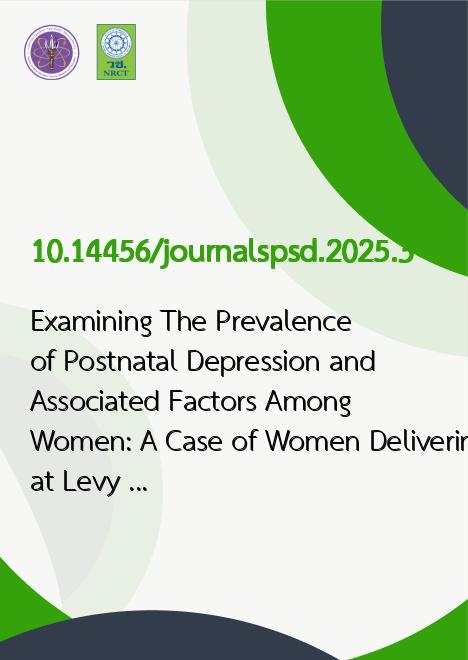
|
Examining The Prevalence of Postnatal Depression and Associated Factors Among Women: A Case of Women Delivering at Levy Hospital |
|---|---|
| รหัสดีโอไอ | |
| Creator | Felix Phiri |
| Title | Examining The Prevalence of Postnatal Depression and Associated Factors Among Women: A Case of Women Delivering at Levy Hospital |
| Contributor | Felix Chibesa |
| Publisher | Faculty of Social Administration, Thammasat University |
| Publication Year | 2568 |
| Journal Title | Journal of Social Policy, Social Change and Development |
| Journal Vol. | 3 |
| Journal No. | 1 |
| Page no. | 34-51 |
| Keyword | Antenatal, Postpartum, Postpartum depression, Postnatal, Pregnancy |
| URL Website | https://so10.tci-thaijo.org/index.php/journalspsd/issue/view/224 |
| Website title | Journal of Social Policy, Social Change and Development |
| ISSN | 2985-0800 |
| Abstract | This study examined the prevalence of postnatal depression (PND) and its associated factors among women who delivered at Levy Mwanawasa Hospital in Zambia. The cross-sectional study surveyed postpartum women using standardized questionnaires to assess PND prevalence and identify related socio-demographic, obstetric, psychological, and biological factors. The findings revealed that most respondents were between 26-30 years old, married, and had primary level education. Despite a high unemployment rate of 76.1%, most respondents reported household incomes above K2,000. The study found that 54.8% of participants experienced post-birth sadness, while 48.6% reported anxiety. The overall PND prevalence was 18.2%, aligning with previous research findings. Financial stress emerged as the most significant contributing factor to PND, with 94.3% of respondents identifying it as a concern. Relationship difficulties (77.9%) and lack of social support (75.8%) were also major factors. Notably, childcare-related stress was not perceived as a significant contributor by most respondents, contrasting with existing literature. The study recommended integrating routine mental health assessments into postnatal care and developing culturally sensitive interventions at the hospital. |